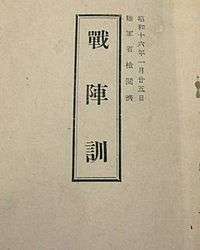Senjinkun military code

The Instructions for the Battlefield (戦陣訓 Senjinkun) was a pocket-sized military code issued to soldiers in the Imperial Japanese forces on 8 January 1941 in the name of then-War Minister Hideki Tojo.[1] It was in use at the outbreak of the Pacific War.
The Senjinkun was regarded as a supplement to the Imperial Rescript to Soldiers and Sailors, which was already required reading for the Japanese military. It listed a number of exhortations regarding military regulations, combat readiness, esprit de corps, filial piety, veneration of Shinto kami, and Japan's kokutai. The code specifically forbade retreat or surrender.[2] The quote "Never live to experience shame as a prisoner" was repeatedly cited as the cause of numerous suicides committed by soldiers and civilians.
Japanese soldiers were instructed to "show mercy to those who surrender"—a response to prior misconduct on the battlefield.[3][4]
Towards the end of the war, copies of the Senjinkun were also distributed to the civilian population of Japan as part of the preparation for Operation Downfall, the expected invasion of the Japanese home islands by Allied forces.
Excerpt from the Senjinkun introduction
- The battlefield is where the Imperial Army, acting under the Imperial Command, displays its true character, conquering whenever it attacks, winning whenever it engages in combat, in order to spread the Imperial Way far and wide so that the enemy may look up in awe to the august virtues of His Majesty.[5]
- The Imperial Rescript to the armed forces is explicit while the regulations and manuals clearly define conduct in combat and methods of training. Conditions in the zone of combat, however, tend to cause soldiers to be swayed by immediate events and become forgetful of their duties. Indeed, they should be wary there, lest they run counter to their duties as soldiers. The purpose of the present Code lies in providing concrete rules of conduct, in the light of past experience, so that those in zones of combat may wholly abide by the Imperial Rescript and enhance the moral virtues of the Imperial Army.
Subsequent chapters
- The Empire
- Discipline
- Unity
- Co-operation
- Aggressiveness
- The Conviction to Win
- Piety
- Filial Piety
- Salutes and Manners
- The Way of Comrades in Arms
- Initiative in Exemplary Conduct
- Responsibility
- Views on Life and Death
- Honor
- Simplicity and Fortitude
- Integrity
- Counsel Concerning Field Service
- Achievements of Soldiers in the Field
- Conclusion
Related works
A similar military code titled Precepts Concerning the Decisive Battle was issued by War Minister Korechika Anami on 8 April 1945. The Precepts stipulated that Imperial Japanese Army officers and men should:
- obey the Imperial Rescript to Soldiers and Sailors and proceed to abide by the Imperial Will
- defend Imperial soil to the last
- await the future, after preparations have been effected
- possess a deep-seated spirit of ramming suicide
- set the example for 100,000,000 compatriots.
References
- Dear, ICB; MRD Foot (2002). The Oxford Companion to World War II. Oxford University Press. ISBN 0-19-860446-7.
- Dower, John W (2000). Embracing Defeat: Japan in the Wake of World War II. WW Norton & Company. ISBN 0-393-32027-8.
- Dower, John W (1987). War Without Mercy: Race and Power in the Pacific War. Pantheon. ISBN 0-394-75172-8.
- Toland, John (1970). The Rising Sun: The Decline and Fall of the Japanese Empire 1936-1945. Random House. ISBN 0-8129-6858-1.
Notes
- ↑ Dear, The Oxford Companion to World War II, page 47.6
- ↑ Toland, The Rising Sun: The Decline and Fall of the Japanese Empire, page 512.
- ↑ Dower, War Without Mercy: Race and Power in the Pacific War, page 26
- ↑ Gyokusai or "Shattering like a Jewel": Reflection on the Pacific War
- ↑ Dower, Embracing Defeat: Japan in the Wake of World War II, page 277.
